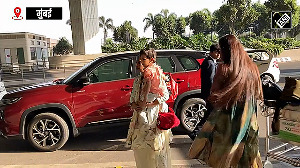India on Friday envisaged an 'extremely successful and historic' SAARC summit, buoyed by the agreements on tackling terrorism and free trade.
But Pakistan, which has shown uncharacteristic flexibility on certain key issues, continued to press for a sustained bilateral dialogue on Kashmir outside the framework of the regional grouping.
| |||||||||||
"We have made very significant breakthroughs and the Islamabad summit is indeed going to be extremely successful and historic," he told reporters on Friday night.
Ending two years of arguments over the issue of terrorism, Pakistan agreed to an additional protocol on terrorism, which provides for extradition of terrorists, mutual legal assistance, choking off funds to terrorists and denial of refugee status to them.
Islamabad refrained for the first time from making its customary reference to Jammu and Kashmir at the foreign ministers' meeting where Sinha and his Pakistani counterpart Khurshid Mehmood Kasuri publicly embraced each other.
But the guessing game on whether Prime Minister Atal Bihari Vajpayee, who arrives here on Saturday, will meet President Pervez Musharraf or his Pakistani counterpart Zafarullah Khan Jamali continued, although it seems unlikely that such a meeting will not take place.
Sinha maintained that he was not in a position to end the 'suspense', telling reporters: "I would like you to remain in suspense for now."
On his part, the Pakistan Foreign Office spokesman Masood Khan too painted a positive picture of the deliberations of the foreign ministers, saying they had met in a 'spirit of cooperation and understanding'.
Noting 'a higher degree of consensus' on SAARC-related issues, he nonetheless emphasised that India should agree to a 'sustained and substantive' dialogue on Jammu and Kashmir and other bilateral issues.







 © 2025
© 2025